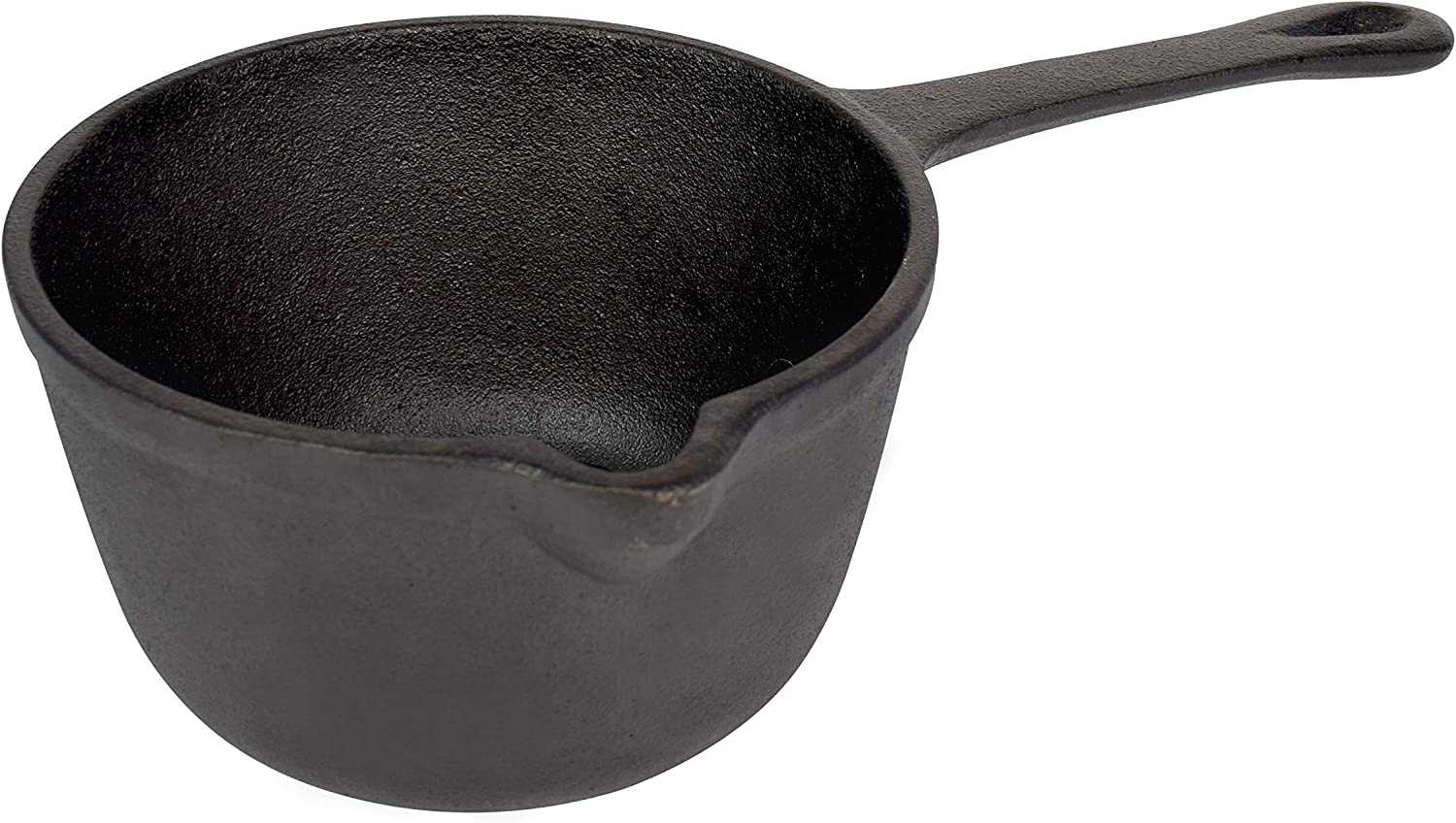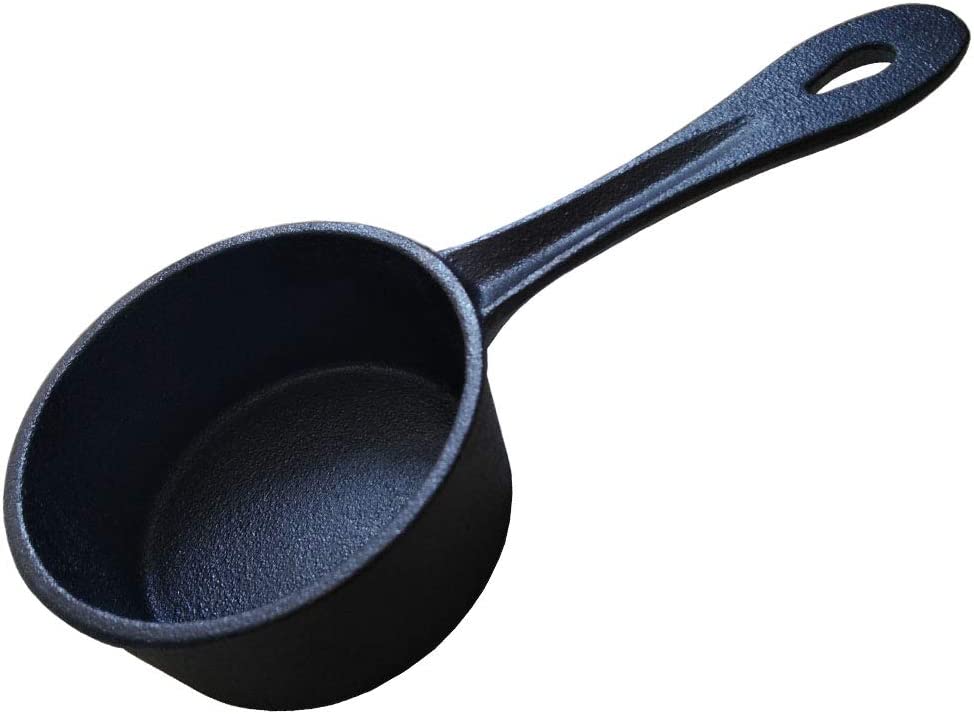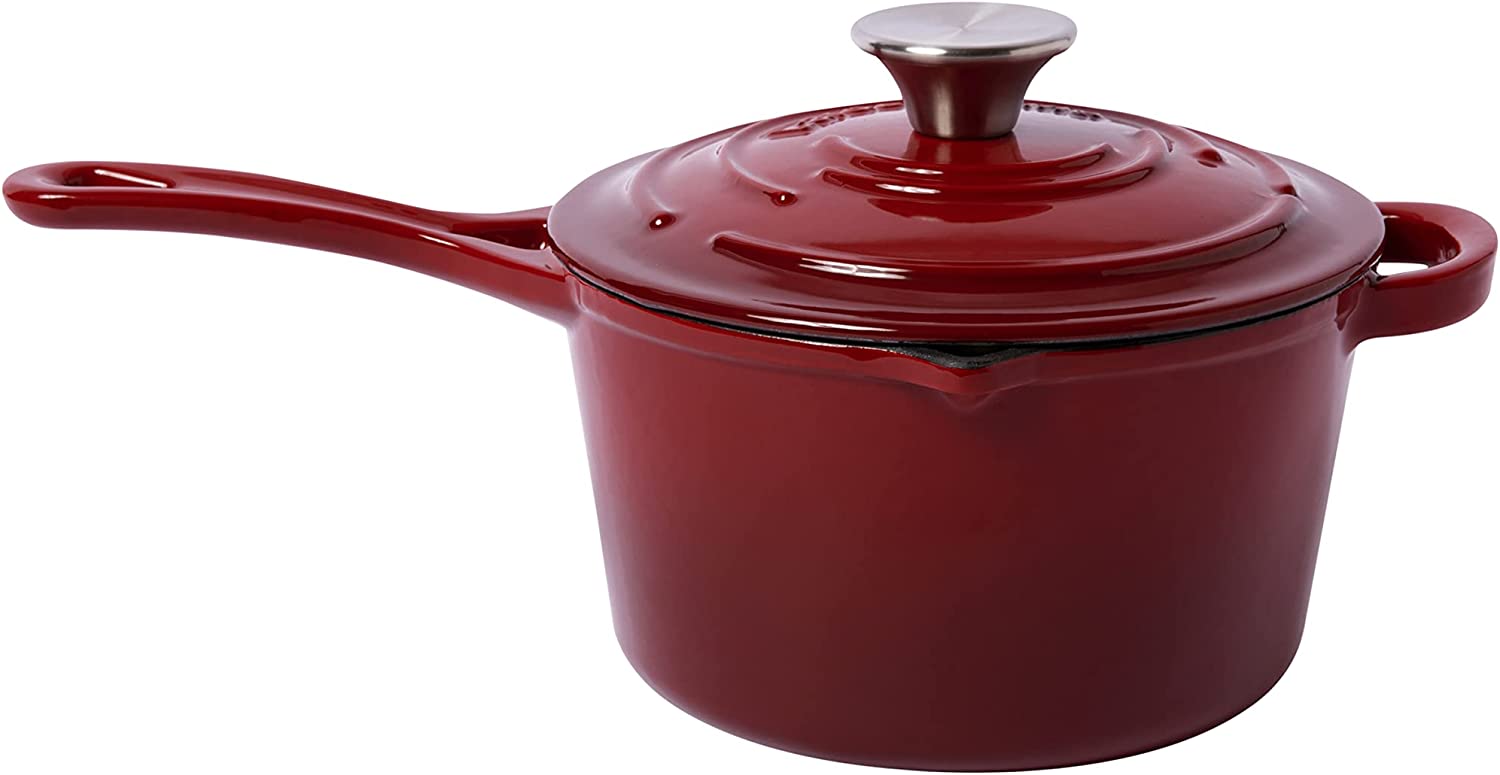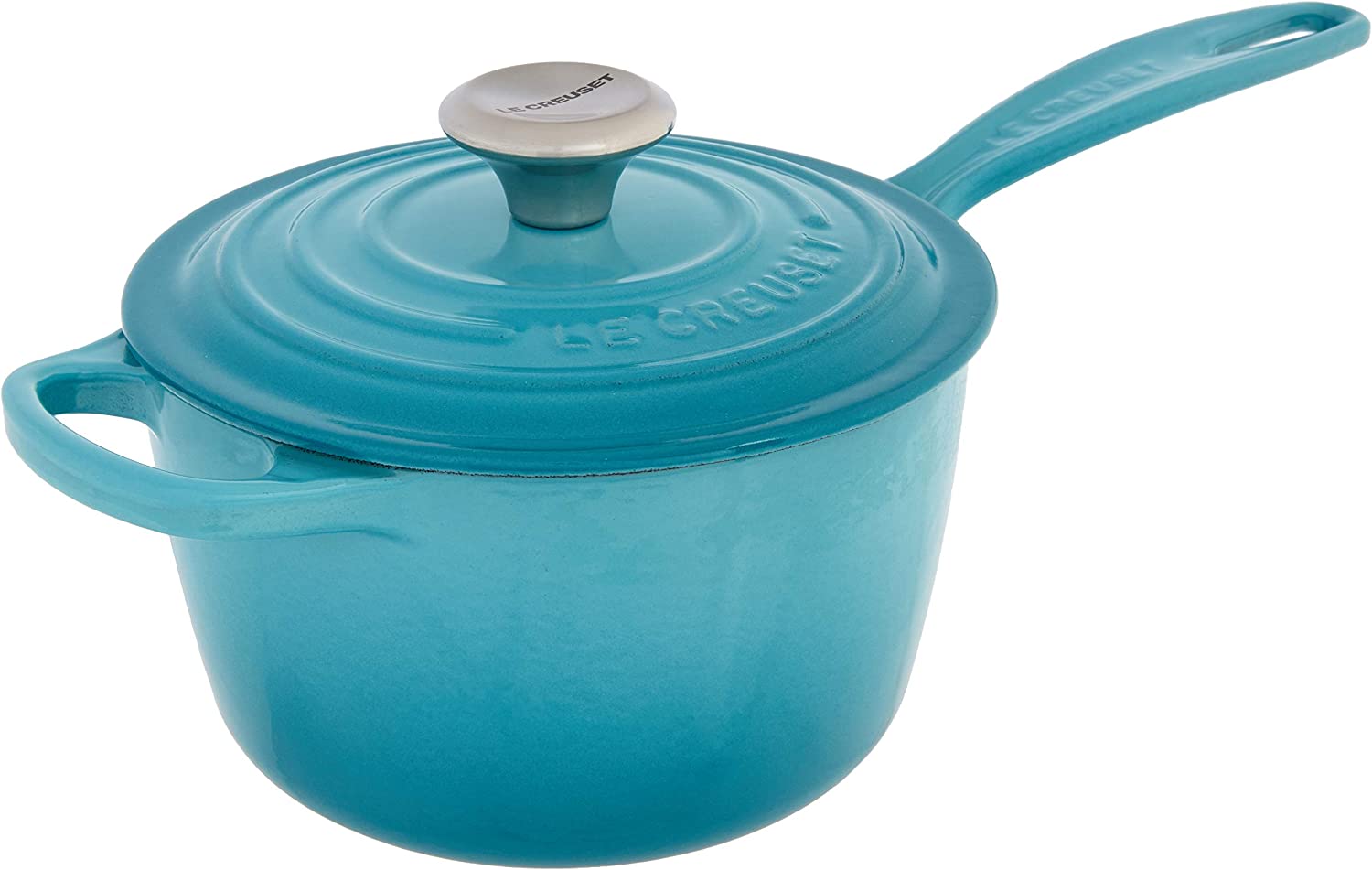Cast Iron Saucepan
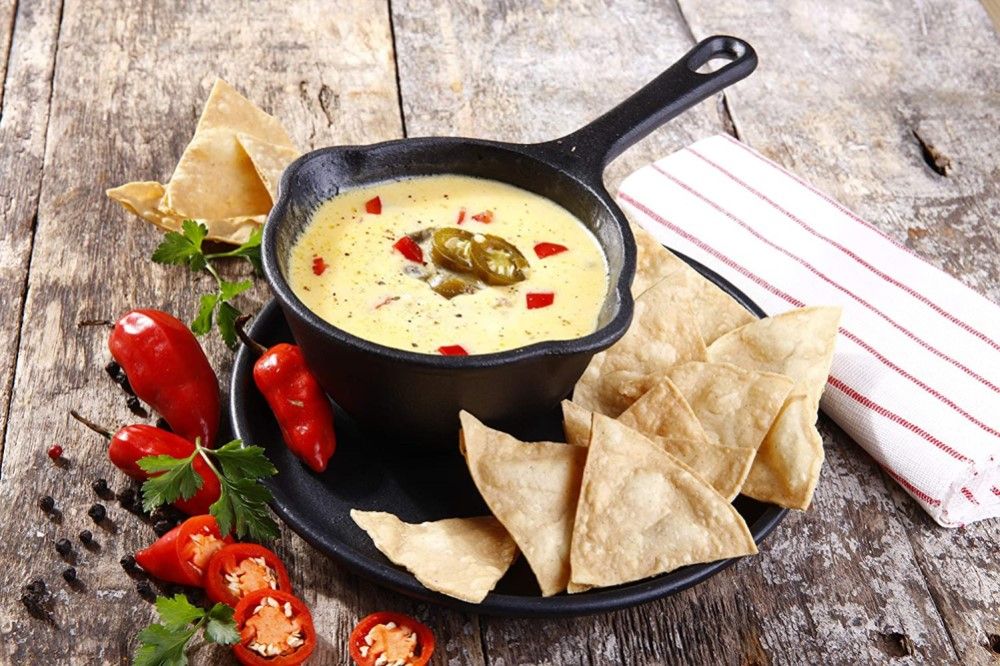
You know that feeling you get when you walk into a kitchen and see a beautiful, shiny new saucepan? It just makes everything feel better, doesn't it?
Well, we've got some good news for you. A cast iron saucepan can give you that same feeling – every time you cook. They're durable, long-lasting and heat up evenly, so your food will always turn out perfectly.
Plus, they come in all sorts of fun colors and designs so you can find the perfect one to match your kitchen. And who knows? Maybe this will be the saucepan that finally helps you make the perfect sauce.
Cast Iron Pan: What Are the Benefits?
If you're a fan of cooking, chances are you're familiar with cast iron cookware. Cast iron is made from pig iron, which is melted and cast into molds to create the desired shape. It's then seasoned with oil or fat, which helps to prevent rust and stickiness.
A cast iron saucepan, as the name suggested, is a type of saucepan that is made from cast iron. It is generally used for cooking tasks such as frying, sautéing, and boiling. Cast iron has many benefits over other materials, especially affordability, they are usually fairly cheap. And also its ability to heat evenly and retain heat for longer periods of time. They are also very durable and can last for many years with proper care. Cast iron has a natural non-stick surface that gets better with age. Plus, cast iron is cheap to make, and therefore most cast iron cookware is very affordable.
Generally, unless specifically mentioned in the manufacturer's manuals or instructions, you should avoid washing any cast iron cookware with soap and not put them in a dishwasher, as these will generally remove the oil coating.
Seasoning the Pan
A cast iron saucepan is a versatile kitchen tool that can be used for everything from frying eggs to simmering stews. However, before you can start cooking with your cast iron saucepan, you need to season it. Seasoning is a process of coating the pan with oil and then heating it, which helps to create a non-stick surface and prevent rust. There are a few different methods for seasoning a cast iron saucepan.
Here is one way to do it:
First, preheat your oven to 400 degrees Fahrenheit. Then, wash your cast iron pan with soap and water. Next, dry the pan thoroughly and coat it with vegetable oil or shortening. Be sure to cover the entire surface of the pan, including the sides and handles. Then, place the pan in the oven upside down on the top rack. Bake for one hour, then turn off the oven and allow the pan to cool completely. Once cooled, your cast iron pan is ready to use.
You may want to re-season the pan from time to time with vegetable-based oil or shortening to preserve its non-stick capability and prevent rusting. With a little bit of care, a cast iron saucepan can be a great asset in any kitchen that will last a lifetime, or two.
Enameled Cast Iron Saucepan
Enameled cast iron is cast iron has been coated with enamel porcelain. This makes it highly durable and gives it a smooth porcelain surface that is easy to clean. It also means that any enameled cast iron cookware can go from the stovetop to the oven without any problems. And because they're made from cast iron, they are excellent at retaining heat. This makes them ideal for slow-cooking dishes like stews and braises.
So what are the benefits of enameled cast iron cookware over other types of cast iron cookware? Well, enameled cast iron is non-reactive, so it won't corrode or rust when exposed to acidic foods. It's also chip-resistant, so it is less likely to get damaged if you happen to bum it onto something else. Plus these pans do not need to be seasoned regularly, effectively you have all of the advantages of a cast iron pan, without all the troubles.
So if you're looking for a dependable and versatile saucepan, enameled pan is definitely worth considering. Below, we will look at some of the best enameled and traditional cast iron saucepans, and we will rate them based on their usability, durability and affordability.
Jim Beam Pre-Seasoned Heavy Duty Construction Cast Iron Basting Pot
Why We Love It
The Jim Beam Pre-Seasoned Heavy Duty Construction Cast Iron Basting Pot is a great addition to your kitchen arsenal. It is very affordable and still provides you with a lot of value.
This pot comes pre-seasoned with vegetable oil, so you can start using it out of the box. It's versatile too - usable on a stove top, oven and even as a grill pan, and it can even be used for frying and sauteing. Plus, it features heavy-duty construction that will last almost a lifetime, with superior heat dispersion and heat retention.
So whether if you're cooking up a quick meal or slow roasting a succulent piece of meat, the Jim Beam Pre-Seasoned Heavy Duty Construction Cast Iron Basting Pot is up to the task.
What You Shoud Know
This pot is perfect for those who are looking for something not too big, but still want a reliable pot to cook with. The pot comes pre-seasoned with vegetable oil, so you can use it right away. However, it is recommended that you re-season it from time to time to keep it in optimal condition. With its heavy duty construction, this pot is built to last and will be a great addition to your kitchenware collection.
Our Candid Ratings
HAWOK DIA.3.8inch Cast Iron Melting Pot Pre-Seasoned Sauce Pan
Why We Love It
If you're looking for an affordable and durable saucepan, the HAWOK DIA.3.8inch Cast Iron Melting Pot Pre-Seasoned Sauce Pan is a great option. Made of cast iron, it's built to last and has superior heat retention and dispersal. It's also pre-seasoned with a vegetable-oil formula so you can use it straight out of the box.
Plus, it's easy to clean - even after removing it from the fire. So if you're looking for a pot that can handle anything you throw at it, the HAWOK DIA.3.8inch Cast Iron Melting Pot Pre-Seasoned Sauce Pan is a great choice.
What You Should Know
This little pot is the perfect size for when you want to make a small batch of your favorite sauce. The non-stick surface is great for cooking and easy cleanup, and the compact size means it won't take up a lot of space in your kitchen. For best results, we recommend re-seasoning it occasionally to preserve the non-stick surface and prevent rust.
For cleaning, just scrub it with a stiff brush and hot water - do not use any soap. And don't put it in the dishwasher - that'll ruin the seasoning. Pre-seasoned with vegetable oil, usable straight out of the box.
Our Candid Ratings
Larder & Vine Enameled Cast Iron Classic Saucepan
Why We Love It
This beautiful piece is made from durable cast iron and coated in a vibrant enamel that will add a pop of color to your kitchen. The stainless steel top is oven-safe, so you can confidently bake or roast your favorite recipes. And the smooth enamel finish on the interior resists sticking and staining, making cleanup a breeze. Whether you're a novice cook or a seasoned pro, this versatile saucepan is sure to become a staple in your kitchen.
What You Should Know
The enamel coating on this saucepan means there is no seasoning needed, you can just use it like any stainless steel saucepan. The saucepan is also extremely durable and easy to clean, making it a practical addition to any cookware collection.
Though you should only hand wash it and always let it cool down before cleaning. You can clean it by soaking it in hot water and dish soap. Only use a soft sponge to clean and never use a steel wool scrubber as this will damage the coating.
You should use wooden or silicone utensils, refrain from using metal utensils as this may cause scratching and chipping.
Our Candid Ratings
Le Creuset Enameled Cast Iron Signature Saucepan
Why We Love It
If you have the budget, definitely go for the Le Creuset Enameled Cast Iron Signature Saucepan.
This pan is perfect for all kinds of cooking, from sauteing and frying to simmering and boiling. It's made from cast iron, so you know it will distribute heat evenly and has excellent heat retention. And because the interior is light colored, it's easy to monitor your food as it cooks.
Plus, the enamel coating is durable and easy to clean, it also means it requires no seasoning, so you get all advantages of a cast iron saucepan, without the troubles of seasoning or care.
So if you're looking for a top-of-the-line saucepan that will make cooking easier and more enjoyable, then look no further than the Le Creuset Signature Saucepan!
What You Should Know
Available in two sizes, 1.75 quart and 2.25 quart, this saucepan is perfect for everything from cooking pasta to simmering soup. The enameled construction ensures even heat distribution and prevents sticking, while the interior sand-colored enamel prevents scorching and makes cleanup a breeze. And best of all, no seasoning is required - just put it to use straight out of the box! This saucepan is also dishwasher safe, though we recommend handwashing to preserve the enamel finish. Always dry before storing and it will probably last you a lifetime.
Our Candid Ratings
Cast Iron Saucepan FAQs
Are cast iron pans really better?
Yes!
Cast iron pans are a great choice for cooking because they heat evenly and perform well at high temperatures. They're also very durable and can last for years if properly cared for.
One thing to keep in mind, though, is that cast iron pans must be seasoned before use. This involves coating the pan with a thin layer of oil and baking it in the oven to help protect the metal from rusting. seasoning your pan regularly will help keep it in good condition.
What are the disadvantages of cast iron cookware?
Cast iron cookware has a few disadvantages.
The main disadvantage is that it is not suitable for cooking acidic food (unless it's enameled coated). So you should avoid cooking food with vinegar or tomato sauce on it.
Another disadvantage is that cast iron cookware can rust if it's not properly cared for. You need to make sure you season it properly and keep it dry, or it will start to corrode.
Cast iron cookware also takes longer to heat up than other types of cookware, but once it's hot, it retains the heat very well.
What can you not cook in cast iron?
There are a few things you can't cook in cast iron, but it's nothing that can't be remedied. For example, you can't cook foods that contain a high level of acidity, such as tomatoes or rhubarb. This is because the acid will corrode the cast iron and give your food an unpleasant taste.
You also can't cook foods with a high sugar content, like candy or syrup, because the sugar will caramelize and give your food an off taste. Finally, you should never wash your cast iron pan with soap - doing so will strip away the seasoning that builds up over time and results in a less-than-optimal cooking surface. Instead, just scrub it clean with hot water
Is it better to cook on stainless steel or cast iron?
It depends. Stainless steel is better for acidic foods, while cast iron is better for savory foods.
Stainless steel cookware is made of a stainless steel alloy which contains chromium and nickel. The chromium in the alloy forms a thin, invisible oxide layer on the surface of the metal that prevents corrosion and staining. Nickel is added to the alloy to make it harder and more durable.
Cast iron cookware is made from pig iron, which is a type of iron that contains a higher than usual amount of carbon. The carbon in the pig iron combines with the oxygen in the air to form a hard, black coating called "carbon steel" or "cast iron". This coating makes cast iron pots and
Why does my cast iron keep sticking?
There could be a few reasons why your cast iron skillet is sticking. One possibility is that you're not using the right kind of oil. Cast iron needs a light coating of oil to prevent sticking, and some oils work better than others.
Another possibility is that you're not heating the pan up enough before adding food. Cast iron needs to be heated for several minutes before adding food so that the oil will start to heat up and create a non-stick surface. If you add food to a cold pan, it will stick.
And finally, it's possible that your food isn't releasing from the pan properly. This can happen if you're cooking something like eggs and they start to stick to the bottom of the pan
Do you add oil to cast iron when cooking?
There is a lot of debate on this topic, but in general, most people do add oil to their cast iron pan before cooking. The oil helps to maintain the oil coating on your pan, which prevents sticking and reduce the need to re-season your pan. Additionally, the oil enhances the flavor and texture of the food.
That said, there are some people who don't add oil to their cast iron pans, arguing that it's not necessary and that it actually makes food taste bad. So it's really up to you whether or not you want to use oil - just be sure to test out different methods and see what works best for you.
How often do you season cast iron pans?
You don't need to season cast iron pans very often at all. Maybe once or twice a year if the food starts sticking to your pan a bit more than usual.
Is it OK to boil water in cast iron?
Yes, it is generally safe to boil water in cast iron, though there are a few things you should keep in mind. First, make sure the cast iron pot or skillet is thoroughly seasoned before use. Seasoning helps to create a natural non-stick coating on the surface of the pan, which will make it less likely to stick and easier to clean.
Second, avoid using high heat when boiling water in cast iron. Cast iron can heat up quickly and retain a lot of heat, so using high heat can cause the water to boil over or damage the pan. Instead, use medium or low heat when boiling water in cast iron. This will help prevent any problems and also conserve energy.
Why do you season a cast iron pan upside down?
Seasoning a cast iron pan upside down helps create an even coating on the pan. If you season a pan right-side up, the oil will pool at the bottom of the pan and not coat the entire surface. By seasoning it upside down, the oil will spread more evenly and create a nice, even coating.
How do you clean a cast iron pan after cooking?
There are a few different ways to clean a cast iron pan after cooking. One way is to use a stiff brush and some hot water to scrub the pan clean. Another way is to use salt and a little bit of oil to scrub the pan clean.
What happens if you clean cast iron with soap?
Soap can remove the seasoning from your cast iron pan and leave it unprotected against rust. If you must clean your cast iron with soap, make sure to re-season it afterwards.
How can you tell if cast iron is seasoned?
If a cast iron pan is seasoned well, it will have a black, nonstick surface. The seasoning is a layer of polymerized fat that covers the surface of the pan and protects it from rust.
Generally, a well-seasoned pan will provide you with non-stick capability. If you find that more food start to stick to the pan, that probably means the pan needs to be re-seasoned.
Do I need to season cast iron after each use?
You don't need to season cast iron after each use, but it's a good idea to do so every few months. The seasoning will help protect the cast iron from rusting and also help create a non-stick surface.
Do you need to season cast iron before first use?
Yes, you should season cast iron before using it for the first time. Seasoning helps to create a natural nonstick coating on the pan's surface. However, many cast iron cookware being sold nowadays come pre-seasoned, meaning it has already been seasoned by the manufacturer, such products do not require seasoning before first use. Check the specifications with the manufacturer if in doubt.
Can you use cast iron without seasoning?
Yes, you can use cast iron without seasoning. However, it is not recommended, as un-seasoned cast iron will be more prone to rusting and pitting. Also it will not function as a non-stick pan.
Why is enameled cast iron better?
Enameled cast iron is better because it has a porcelain enamel coating that is applied in a factory before the cookware is shipped. This coating creates a durable, smooth, and impermeable surface that is non-reactive with food and does not require seasoning.
Conclusion
We hope you enjoyed our helpful tips on what to look for when purchasing a cast iron pan. If you’re still undecided, maybe our reviews of specific products will help seal the deal. Below is the list of our recommendations:




And remember, if you take good care of your cast iron saucepan it will last forever… or at least until you accidentally drop it and it shatters into a million pieces. Either way, we hope this article was helpful in your journey to becoming a master chef!
